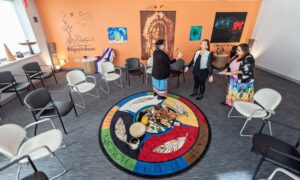Indigenous-led mental health program launched in the London-Middlesex region

By Colin Graf
LONDON— A new mental health program is being launched to help local First Nation people in the London-Middlesex region. Co-delivered by Atlohsa Family Healing Services and St. Joseph’s Health Care London, Biigajiiskaan: Indigenous Pathways to Mental Wellness is a referral-based, mental wellness program that aims to provide accessible, culturally-safe, specialized care for Indigenous people with serious mental illness, addictions, and concurrent disorders.
The new initiative includes a dedicated Indigenous Healing Space located at St. Joseph’s Parkwood Institute in the Mental Health Care Building, which provides the opportunity to combine traditional healing medicine and Elder-guided care and ceremony with hospital-based health care practices and psychiatric treatment.
“To this day, we know that our community members continue to experience systemic racism and discrimination in institutions. Many are reluctant to go to hospital or access help from health care agencies,” says Raymond Deleary, Atlohsa’s Executive Director.
He says trauma experienced by First Nations people during the history of colonization, such as in residential schools and Indian hospitals, has caused the loss of language, culture, and the sense of safety and community.
“Systemic change is not optional; these bridges must be built with a strong foundation for sustainability.”
“We know that the rate of mental illness and addictions among Indigenous people is more than double that of non-Indigenous individuals in Canada. And suicide rates among Indigenous youths are five times higher. There is clearly an urgent need for culturally safe, traditional healing programs as an integral part of care,” says Jodi Younger, Vice President of Patient Care and Quality at St. Joseph’s. “We are so proud to be working alongside our Indigenous health partners to address the need for institutional change, to support and enable the provision of culturally-safe services and to begin building additional care partnerships for the health of the Indigenous people we serve.”
Biigajiiskaan services are available to inpatients, outpatients and community outreach clients of St. Joseph’s Mental Health Care Program, or by referral through Atlohsa to the First Nation population in the London-Middlesex and St. Thomas-Elgin County regions. The services include a mobile outreach team working in both the hospital and community, providing consultation, assessment, treatment planning and management, and discharge planning.
“All too often, Indigenous people do not see themselves reflected in the majority of society,” Deleary says. “Being able to create a mutual space, in partnership with St. Joseph’s, where the Indigenous community is free to be themselves and experience care and services that are being led by their own community, creates a sense of hope.”
The Okwari: Kowa Healing Space at the Parkwood site will accommodate traditional practices such as healing circles, ceremony, smudging and drumming circles.
“Through this partnership, to the best of our ability, we are attempting to embody the true spirit and intent of the treaties and historical relationships that were originally intended to form between our Indigenous nations and the settler nations,” explains Deleary. “What’s beautiful about this program approach is that neither partner is greater than the other; we each have gifts to offer to this service, but the Indigenous community is where the strengths lie to address Indigenous wellness overall.”
Prior to this program, there were no Indigenous-led services fused with in-hospital care in the London region, Deleary says in an e-mail to Anishinabek News. Planning for Biigajiiskaan began in spring 2018 by a project team from both agencies, whose members worked to develop an integrated care model and care path. Over 200 First Nation patients and family members were consulted during the development period, Deleary says.
“Due to colonization and systemic racism over many generations, First Nations people have been disconnected from the essence of who they are,” explains Liz Akiwenzie, Biigajiiskaan’s wellness Knowledge Keeper and cultural educator, quoted on the St. Joseph’s website. “We help them to understand – mentally, emotionally, physically and spiritually – how they are put together, that they are connected to themselves, to the creator, to family, to community and to nation…In the Indigenous world view, everything is about heart, mind, body and spirit – we are all interconnected.”
The name Biigajiiskaan (BEE-GAW-JEES-GAWN) describes how a broken and rotting tree stump feeds new life. It acknowledges the importance of all living things working together in harmony for the greater good, according to the website.
Belinda Rogers-King, an outpatient of St. Joseph’s Mental Health Care Program who was engaged in the early stages of the program’s development, believes it is much needed and long overdue.
“Until you actually face discrimination because of your race, you can’t fully understand it,” says Rogers-King, quoted on the St. Joseph’s website. “It’s important to have Elder guidance from someone who understands the history to teach us where we came from and what has moulded us; someone who has walked in our shoes because we are all survivors, not victims.”
The Biigajiiskaan Team is made up of eight specialists, including a project lead, coach/team administrator, addictions specialist, clinical lead, Indigenous Knowledge Keeper, Shkaabewis (Helper), registered practical nurse and a psychiatrist. Together with other Atlohsa staff, the team reaches out to area Indigenous communities and Indigenous-serving agencies with the goal of making connections and helping to facilitate access to Biigajiiskaan, according to Atlohsa’s website.
Atlohsa is a non-profit, charitable organization, dedicated to strengthening community through Indigenous-led programs and services that offer holistic healing and wellness. Atlohsa has been serving individuals and families in southwestern Ontario for over 33 years, providing services to those with complex needs, including mental wellness, substance use, homelessness, domestic violence, and trauma.


